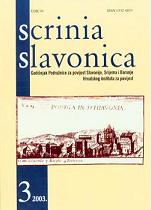Trgovačke prilike na vukovarskom području 1868-1914. (Prilog proučavanju gospodarske povijesti Slavonije i Srijema)
Conditions of commerce in Vukovar region 1868-1914 (A contribution to the economic history of Slavonia and Srijem)
Author(s): Zdenka BaždarSubject(s): History
Published by: Hrvatski institut za povijest
Keywords: Vukovar; Eastern Slavonia; period of the Nagodba (Agreement); trade; transportation; fairs; house-to-house sale
Summary/Abstract: This article deals with the position of commerce in the region of Vukovar during the so-called Period or the Nagodba (Agreement) 1868 – 1914. The author attempts to describe the position as well as traffic and commercial opportunities of Vukovar. Furthermore, she is concerned with the type of goods and trade carried on by registered stores on fairs and trade plied at people’s homes. The article is based on archive sources and printed material. Thanks to its position on the Danube the market town of Vukovar has always been an important centre of trade of a variety of agricultural products from the Syrmian county and the borderland region. The trade of cereal crops was particularly flourishing because the river transport on the Danube was much more convenient and as such, it affected favourably the increase of the selling price of cereal crops and other agricultural products. After the local railroads towards Vinkovci had developed, the trade started to concentrate in other places, which made Vukovar and its surrounding lose their importance. During the aforementioned Period of the Nagodba (Agreement) 1868 – 1914 the trade in the region of Vukovar was largely influenced by the Hungarian set of laws and reduced traffic, especially if compared to other parts of Slavonia. It all resulted in the emergence of various limitations of trade business. In addition to the registered stores and merchants who sold their products at people’s homes, fairs exerted considerable influence on the commercial and social life of Vukovar. During the Period of the Nagodba (Agreement) and through public administration modernization of the Slavonian economy started to flourish. As far as trade in the Vukovar area was concerned, even with its export activities it declined if compared to the former periods marked by a more dynamic trade. Natural resources, agricultural products, timber, wine, fruit etc. offered much more opportunities for the domestic and foreign trade of goods, which, due to the political framework, was virtually absent.
Journal: Scrinia Slavonica
- Issue Year: 2003
- Issue No: 3
- Page Range: 231-246
- Page Count: 16
- Language: Croatian

